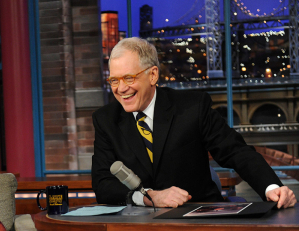
Legendary American comedian David Letterman signed off for the final time on the "Late Show" on Wednesday night after spending more than 30 years in the television industry. His final show at CBS also drew in his biggest audience since 1994.
According to John Koblin of the New York Times, Letterman's finale beat every network show in prime time on Wednesday, attracting 13.7 million viewers. It was also "the fourth-most-viewed show since Mr. Letterman joined CBS in 1993."
"Mr. Letterman had no formal guests on Wednesday night but the show featured a star-studded Top 10 list, with appearances from, among others, Chris Rock, Bill Murray, Tina Fey and Peyton Manning," Koblin wrote. "Mr. Letterman delivered his final words from his desk ('The only thing I have left to do for the last time on a television program: thank you and good night') and handed it over to the Foo Fighters."
Koblin added that the "Late Show" ran an extra 20 minutes long, receiving a 3.1 rating in the 18-to-49-year-old demographic based on data from Nielsen. Letterman has also served as an inspiration for other comedians, including those currently on late-night television in the United States.
"ABC's Jimmy Kimmel ran a rerun so as not to compete with Mr. Letterman's finale, and Conan O'Brien on TBS repeatedly told his viewers to turn off his show to watch 'The Late Show' finale," Koblin wrote.
However, Koblin pointed out that despite Letterman's influence in American culture, the "Late Show" was mostly behind in terms of ratings for the 11:30 p.m. weekday timeslot.
"He consistently drew lower ratings than Jay Leno on NBC's 'The Tonight Show,' and on Wednesday he fell short one last time," Koblin wrote. "Mr. Leno's finale on 'The Tonight Show' in February 2014 attracted 14.6 million viewers, almost a million more than Mr. Letterman's did."
As for the legacy that Letterman left behind, Rob Sheffield of Rolling Stone contended that late-night TV in the U.S. has devolved into "an oasis of niceness" full of "polite whippersnappers" after the comic's departure.
"Any schmuck can be moody and rude," Sheffield wrote of Letterman's comedic style. "It takes a comedian of David Letterman's constitution to pull it off, night after week after year, and remain funny. That's why it's all different without him."
Sheffield added that the departure of Letterman, along with John Stewart (who is leaving "The Daily Show" in August), has led to the late-night circuit developing into "the last beacon of civility."
"Late night in general has grown too emotionally stable," Sheffield wrote. "Johnny Carson and Letterman didn't care if you liked them or not - in those days, what else were you going to watch? So they had no incentive to treat their guests with kid gloves."
Sheffield's overall point was that late-night television has now taken a "friendly approach," which is a lot different from what both Stewart and Letterman did on their respective shows.
"The new model is that late night is a place where nobody flops. Something's gained there. But something's lost as well," Sheffield wrote. "With the exit of Letterman and Stewart, it's gone for good."






